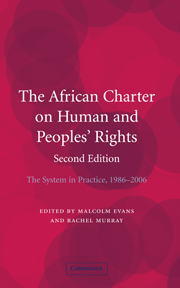Book contents
- Frontmatter
- Contents
- List of contributors
- Table of cases
- List of abbreviations
- Editors' Preface
- Introductory Preface: The African Charter and African Commission on Human and Peoples' Rights
- 1 The African Union and the Regional Human Rights System
- 2 The State Reporting Mechanism of the African Charter
- 3 Communications under the African Charter: Procedure and Admissibility
- 4 Evidence and Fact-Finding by the African Commission
- 5 Civil and Political Rights in the African Charter on Human and Peoples' Rights: Articles 1–7
- 6 Civil and Political Rights in the African Charter: Articles 8–14
- 7 Group Rights
- 8 The Role of Non-governmental Organisations and National Human Rights Institutions at the African Commission
- 9 A View from the Inside: The Role of the Secretariat
- 10 The Special Rapporteurs in the African System
- 11 Working Groups of the African Commission and their Role in the Development of the African Charter on Human and Peoples' Rights
- 12 The Creation of a New African Court of Justice and Human Rights
- 13 Protocol to the African Charter on the Rights of Women in Africa
- Bibliography
- Index
10 - The Special Rapporteurs in the African System
Published online by Cambridge University Press: 01 July 2009
- Frontmatter
- Contents
- List of contributors
- Table of cases
- List of abbreviations
- Editors' Preface
- Introductory Preface: The African Charter and African Commission on Human and Peoples' Rights
- 1 The African Union and the Regional Human Rights System
- 2 The State Reporting Mechanism of the African Charter
- 3 Communications under the African Charter: Procedure and Admissibility
- 4 Evidence and Fact-Finding by the African Commission
- 5 Civil and Political Rights in the African Charter on Human and Peoples' Rights: Articles 1–7
- 6 Civil and Political Rights in the African Charter: Articles 8–14
- 7 Group Rights
- 8 The Role of Non-governmental Organisations and National Human Rights Institutions at the African Commission
- 9 A View from the Inside: The Role of the Secretariat
- 10 The Special Rapporteurs in the African System
- 11 Working Groups of the African Commission and their Role in the Development of the African Charter on Human and Peoples' Rights
- 12 The Creation of a New African Court of Justice and Human Rights
- 13 Protocol to the African Charter on the Rights of Women in Africa
- Bibliography
- Index
Summary
Introduction
The practice of appointing special rapporteurs to explore the human rights situation, either in a particular State or pertaining to a particular theme, has become a well-established feature of the UN human rights machinery, and ranks among its most innovative achievements. It is, then, no surprise to find that it has been adopted within other systems of human rights protection, including the African regional mechanism. In its relatively short existence, the African Commission has appointed six special rapporteurs on thematic issues: one on extrajudicial executions; one on prisons and other conditions of detention; one on women's rights; one on refugees, asylum seekers and internally displaced persons; another on human rights defenders in Africa; and a final one on freedom of expression. It has not created any country-specific special rapporteurs, but this is hardly surprising. Unlike the UN Commission on Human Rights, the African Commission has an explicit treaty-based competence to examine the situation on a country-by-country basis through the Charter's reporting procedures. Further, a number of ancillary country-specific activities are implicitly addressed through the promotional mandate of the Commission, which is exercised by allocating responsibility for particular countries to individual Commissioners and by its promotional and protective visits to States.
On first glance, then, the record of the Commission is impressive.
- Type
- Chapter
- Information
- The African Charter on Human and Peoples' RightsThe System in Practice 1986–2006, pp. 344 - 378Publisher: Cambridge University PressPrint publication year: 2008



